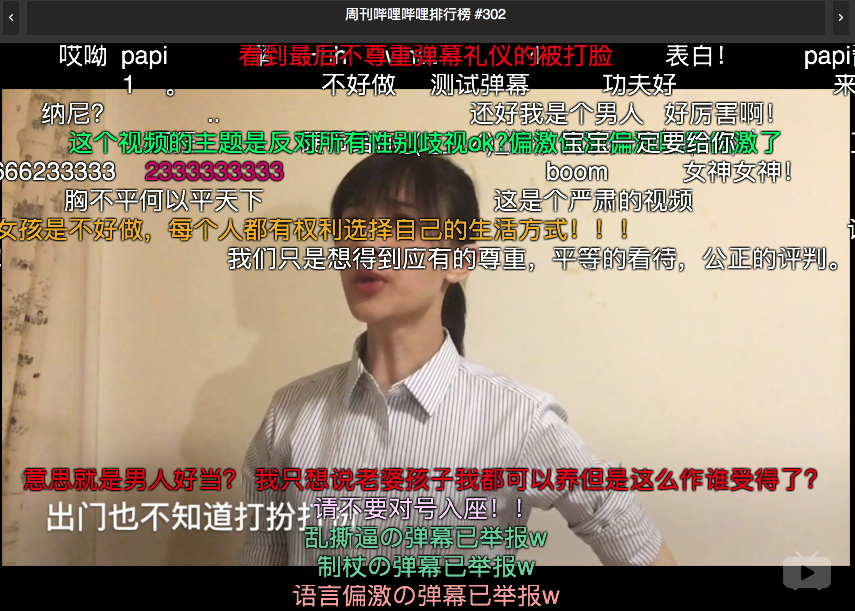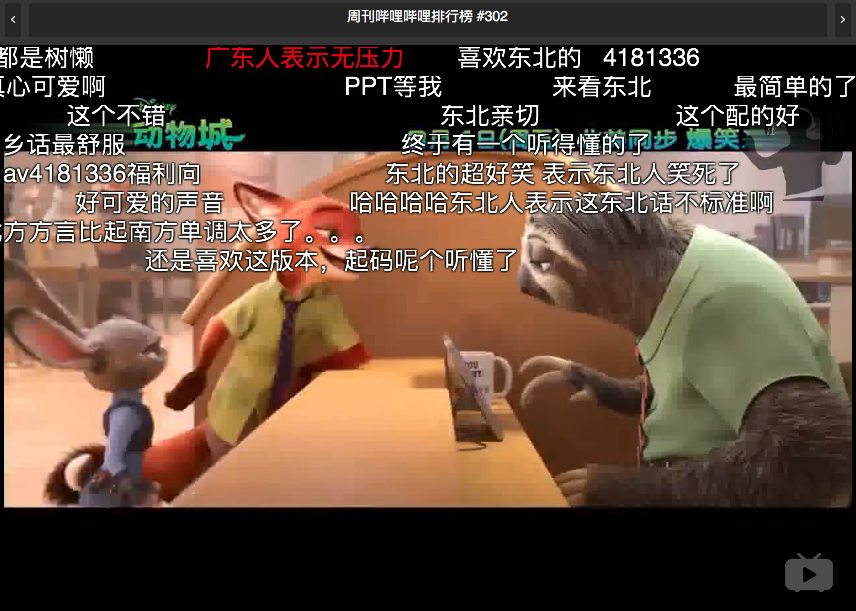Memo #374
By: Ying Guo – gynut2010 [at] 163.com
 Is the film so boring that you can’t help ranting? Find something interesting about that TV show? Why not share your comments and thoughts on the screen? The practice of displaying comments directly on the video screen has attracted tens of thousands who have registered on Chinese “bullet comments” websites. Different from other video-sharing websites like Youtube, comments of bloggers float across the video screen like flying bullets.
Is the film so boring that you can’t help ranting? Find something interesting about that TV show? Why not share your comments and thoughts on the screen? The practice of displaying comments directly on the video screen has attracted tens of thousands who have registered on Chinese “bullet comments” websites. Different from other video-sharing websites like Youtube, comments of bloggers float across the video screen like flying bullets.
When audiences’ comments become so dense, they even fill the entire screen. This might seem distracting to some. However, Chinese teenagers, who constitute three-fourths of registrations on Bilibili, the most popular bullet comments website in China, are crazy about them. Further, the magic of bullet comments is not just in the joy of self-expression, but also in generating new contents.
Rather than just acclaim or spoof, some comments spotlight new meanings and readings of the original video. In the BBC TV drama Downton Abbey, after Lady Mary and Mathew spent the whole season misunderstanding each other, they finally confess their love. Suddenly, comments like “telegram of congratulations from Beijing” and “telegram of congratulations from Hong Kong” jumped out to cover the faces of the two protagonists. Not only mocking at the cliché of romance, the comments parody the routine of CCTV’s Chinese New Year Gala, where the hosts often read out telegrams of congratulations from local governments, companies and overseas Chinese time to time between the performances.
Moreover, bullet comments cultivate community. Because they can only be displayed temporarily, comments need to be compact. Therefore lots of jargons emerge and evolve, for example, “High energy alert” (高能預警, hilarious or surprising scene is coming), “Pick up bento” (領便當, the character is about to die) and “23333333333”(big laugh). This new lexicon forms a communication code for otaku circles or members of bullet comments sites. The comments and the attached jargon create a space where the audience, the original video, and other videos can “play” with each other.
Finally and perhaps predictably, bullet comments have moved out of the cyber world and into the real world. In the summer of 2014, the film called Tiny Times 3 used bullet comments during its showing. In many respects, therefore, bullet comments are the very embodiment of convergence culture, where lines between fandom and authorship, and the virtual and the real are blurred and even merged.
About the Author:
Ying Guo is a graduate student in the Department of Asian Studies at the University of British Columbia. Her current research examines film and print culture of Manchukuo, but as a former journalist, she continues to closely follow the latest developments in China’s mass media and popular culture.

Bullet comments appear in a popular video on the Chinese website Bilibili (Credit: Bilibili).

A fanmade parody video of Zootopia (Credit: Bilibili).
Links
- Bilibili, (the official website of Bilibili).
- “Special session of bullet comments rocked audiences of Tiny Times 3”, Xinhuanet.com, August 6, 2014. (Chinese) 「《小時代3》彈幕專場 初體驗玩嗨整場觀眾」『新華網』 August 6, 2014.
- “The most awesome gathering of the two-Dimensional world: ‘Bilibili Macro Link’ will be held in Shanghai in July”, Online.sh.cn, April 7, 2016. (Chinese) 「2016最炸裂的次元盛會 Bilibili Macro Link七月魔都再開」『上海熱線』April 7, 2016.
- “How viral videos are catapulting English-language instructors to Internet fame”, Global Times, April 7, 2014.
- “CEO of Bilibili Chen Rui: I am a normal person before joining Bilibili ”, Ifeng.com, July 6, 2015. (Chinese) 「Bilibili執行董事長陳睿:我在進b站之前是一個正常人」 『鳳凰網』July 6, 2015.
- Gerard Genette, Paratexts: Thresholds of Interpretation, (Cambridge University Press, 1997).
- Chen Yi, Cao Shengqi, and Wang Tong, “An Examination of a Bullet Comment Website Community: Perspectives on youth subculture,” Exploring Youth, no. 5 (2013): 19-24. (Chinese). 陈一, 曹圣琪, 王彤 <透视弹幕网站与弹幕族:一个青年亚文化的视角>《青年探索》no. 6 (2013): 19-24.
- Xie Mei, He Ju, and Feng Zile, “Bullet Comment Games from a Mass Media Theory Perspective,” Mass Media, no. 2 (2014): 37-40. (Chinese). 谢梅, 何炬, 冯字乐 <大众传播游戏理论视角下的弹幕视频研究>《新闻界》, no. 2 (2014): 37-40.
- Wu Nan, “Do Bullet Comments ‘Fly’ in the Sense of Belonging to a Web Community,” Beijing Evening News, 2016.04.07. (Chinese). 吴楠 <弹幕 “飞翔”的网络归属感?>《北京晚报》2016.04.07.
Related Memos:
See our other memos on China.